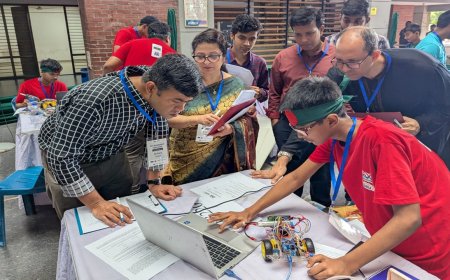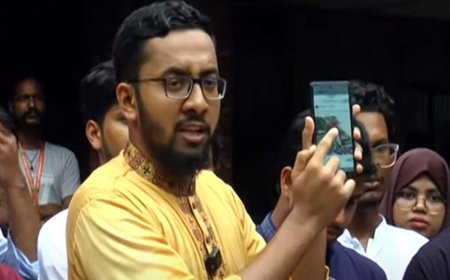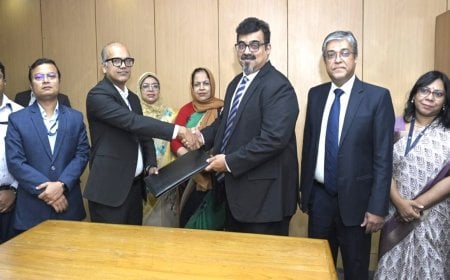Freelancing, Funding, and the Future: Dr. Tanziba Rahman Talks Trends and Trials

As Bangladesh keeps pace with the global digital revolution, freelancing continues to grow as a promising sector for earning foreign currency. The Bangladesh Freelancer Development Society (BFDS), an organization representing freelance professionals across the country, has been at the forefront of this transformation. Its founding president, Dr. Tanziba Rahman, recently shared her thoughts on the state of freelancing in the country in a candid interview with S M Imdadul Haque, Executive Editor of DigiBanglaTech.news, following the announcement of the national budget.
DBTech: Let’s begin with the budget. What are the hopes and disappointments for freelancers this year?
Tanziba: The most hopeful element in the budget is the proposed incentive for freelancers. However, no actual allocation has been made for it this year either. Though there is a promise of a 2.5% incentive for bringing in earnings through legal channels, it hasn’t been implemented yet. If it were, the majority of freelancers would bring their earnings into the country legally. To date, the government hasn’t issued any official circular regarding exchange losses or source tax. As a result, many banks continue to deduct source tax like the NBR does. Some banks are also harassing freelancers over documentation.
DBTech: So, would you say the budget is not freelancer-friendly?
Tanziba: From a progressive standpoint, this budget cannot be considered ICT-friendly.
DBTech: Starlink has been a trending topic. What impact will it have on freelancing?
Tanziba: For those freelancers who have already become entrepreneurs, it presents a good opportunity. But for the average freelancer, it won’t offer much benefit. Only about 5% of the country’s freelancers will be able to use it. That’s why we’re calling for real IPs instead of shared ones, which would ensure better internet service and enable more effective freelancing.
DBTech: With AI being widely discussed, how are Bangladeshi freelancers coping in this field?
Tanziba: There are efforts underway, but the success rate is not at the desired level. Many basic-level AI freelancers are struggling. Previously, people who worked on simple Canva-based designs are losing out because those templates are now AI-integrated. Similarly, in web development and basic app development, there has been a 20% drop in available work.
DBTech: Does that mean the number of freelancers is declining?
Tanziba: No. The total number of freelancers in Bangladesh remains around one million. Every year, about 100,000 new freelancers join, while a similar number drop out.
DBTech: What is BFDS doing to enhance future skills to tackle the AI challenge?
Tanziba: BFDS is running advanced-level, career-oriented freelancing courses at various universities. We’ve organized workshops in both national and public universities. Last year, we held events at three colleges under the National University. Based on feedback from institutions like Green University, North South, and UIU, we’ve seen growing success in graduate-oriented freelancing. For example, a student with an accounting background is excelling in freelancing within that field.
DBTech: The upcoming BPO Summit is gaining attention. How will such summits enhance the freelance community?
Tanziba: These summits naturally raise awareness, which is certainly beneficial.
DBTech: Freelancing is seen as a beacon of hope for unemployed youth. What is its future?
Tanziba: It’s more about the emerging generation—graduates both recent and former—than just unemployed youth. The future of freelancing is bright for them. If you’re not tech-oriented now, you risk losing your job or business within five years. The software sector has already seen significant disruptions. As more complex AI-based technologies like quantum computing, banking security, and algorithmic systems emerge, staying up to date will be essential for survival. Without skills, the next generation is at risk.
DBTech: Has the freelance craze in Bangladesh diminished?
Tanziba: The enthusiasm hasn’t diminished, but the type of work that was once easily available is now limited. Modern technologies and AI have reduced the demand for basic-level services, making it seem like the boom is slowing down.
DBTech: Media often highlights stories of freelancers becoming millionaires. Does this suggest freelancing is now the safest livelihood option?
Tanziba: That portrayal is not entirely accurate. Those who have carefully chosen a niche and upgraded their skills over time are still getting work. Becoming a millionaire is common for them because they earn remittances and can accumulate wealth even with fewer projects. But instead of focusing on success stories, we should prioritize creating a safe and sustainable freelancing ecosystem. Every year, 100,000 to 150,000 freelancers enter the market. Due to unethical practices, around 20,000 to 30,000 drop out. Another 30% leave because of a lack of technical skills. Others exit due to a lack of jobs. Without up-to-date skills, they cannot survive. Unfortunately, the training currently offered in Bangladesh remains too basic and outdated for today’s market.
DBTech: What actions are needed to make this ecosystem sustainable?
Tanziba: Regular skill upgrading, platforms for hiring international mentors, specific financial provisions for incentives, payment gateways, source tax, promotional branding costs—all of these must be structured properly. If we do that, we can build a freelancing hub right here in Bangladesh. For instance, we haven’t yet tapped the vast market for content writing. Globally, there are 253 platforms offering 1,023 types of freelance work. We’ve yet to capture the highly paid segments. That’s why we need more robust training—freelancing must be developed as a full-fledged career. Foreign clients are increasingly outsourcing to freelancers to avoid taxes. We must be ready.
DBTech: Some critics claim freelancing is creating clerks, not innovators. What’s your take?
Tanziba: Freelancers are never clerks. They don’t work fixed hours or under strict supervision. They perform tasks with international-level skills, which requires significant dedication. But the branding we see is often misleading. Freelancers don’t just work jobs—they create jobs. While innovation might not always bring remittance, freelancing consistently does. That’s a fact.
DBTech: But isn’t technology replacing artistic skill? People can’t even write letters anymore…
Tanziba: Even with AI-generated content, a human touch is still necessary. The demand for human-like creativity remains among clients. Artistic flair will always have its place. It’s unique, and uniqueness is always valuable.
DBTech: What kinds of freelancing are most common in Bangladesh today? What fields will see the highest demand going forward?
Tanziba: The demand is rising for AI-based framework development. With AI simplifying front-end tasks, the need for back-end development is growing. Skill in command-based programming is now essential.
DBTech: How do Bangladeshi freelancers rank in terms of technical and soft skills?
Tanziba: Unfortunately, we’re not in a strong position in either area.
DBTech: What was the total freelancing income for Bangladesh last year?
Tanziba: Last year, Bangladeshi freelancers earned about $1.5 billion.
DBTech: After the turmoil of the July uprising, have affected freelancers recovered? Where does Bangladesh stand globally in the freelance landscape?
Tanziba: Some have recovered, but others are still struggling to find work. Their reviews have been affected, making it even harder. In terms of numbers, Bangladesh is doing well globally. But in terms of quality, we still lag behind. As there is no global ranking system based on skills, number, and earnings combined, we can’t say for sure.
DBTech: Thank you for taking the time to speak with us during the holidays.
Tanziba: Thank you, and Eid Mubarak to you and all DigiBangla readers.









































































































































































































